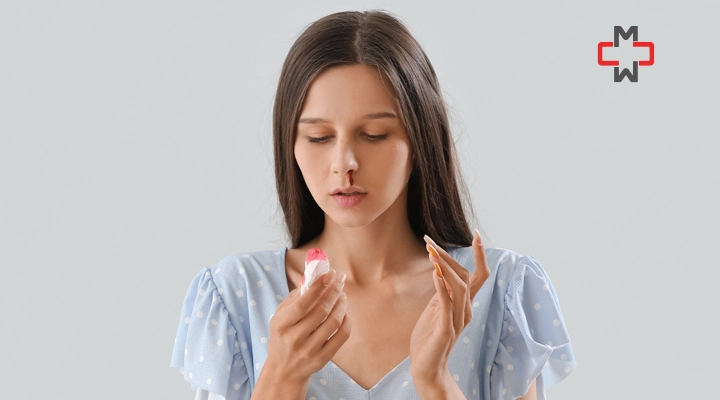Nosebleeds can be scary, but they’re usually not a big deal. If you’re getting them more frequently or only in one nostril, though, it might be time to take a closer look.
What Causes Nosebleeds in One Nostril?
One-sided nosebleeds are often caused by local irritation or injury. Common reasons include:
- Nose Picking or Blowing – This is the most common cause, especially in dry environments or during allergy season.
- Dry Air or Heat – Dry indoor heat or hot summer weather can dry out nasal membranes, making them prone to cracking and bleeding.
- Nasal Allergies – Conditions like seasonal allergies can cause irritation and inflammation inside the nose, leading to bleeding.
- Nasal Infections or Sinusitis – Infections can inflame and damage the blood vessels inside your nose.
- Deviated Septum – When your nasal septum is crooked, one side may dry out more than the other.
Learn more about nasal polyps, which can also be an underlying factor.
What Causes Nose Bleeding in Adults?
In adults, especially older individuals, other causes may include:
- Hypertension – High blood pressure can strain and rupture fragile blood vessels in the nose.
- Medications – Blood thinners or NSAIDs can increase the risk of bleeding.
- Alcohol Consumption – Alcohol dilates blood vessels and can dry out nasal tissues.
- Stress and Anxiety – Yes, stress can trigger nosebleeds indirectly by increasing blood pressure or causing dry mouth and nose.
Explore our guide on managing anxiety and panic attacks for better overall health.
When to Worry About a Nosebleed
You should seek medical attention if:
- The bleeding lasts more than 20 minutes.
- It happens frequently.
- It’s associated with headaches, dizziness, or other symptoms.
- You suspect a foreign object or trauma.
Our primary care physicians like Dr. Syra Hanif are here to help diagnose underlying issues.
How to Stop a Bloody Nose
- Sit up straight and lean forward slightly.
- Pinch the soft part of your nose (not the bridge) for 10-15 minutes.
- Apply a cold compress to your nose and cheeks.
- Avoid blowing your nose or inserting anything into it for several hours afterward.
Explore our post-COVID care services if symptoms started after a recent illness.
Common Symptoms That May Accompany Nosebleeds
- Facial pain
- Nasal congestion or runny nose
- Allergy symptoms
- Headaches
- Anxiety or panic attacks
Can Stress Cause Nosebleeds?
While stress doesn’t directly cause nosebleeds, it can contribute by increasing blood pressure or triggering habits like nose picking or mouth breathing.
Check out our post: Can Stress Cause Nosebleeds?
For more insights on managing stress, visit our mind-body medicine page.
Heat and Summer Nosebleeds
Summer heat can worsen nasal dryness, especially if you’re spending lots of time in air-conditioned or dry environments. Keep hydrated and use a humidifier.
Nosebleed Treatment and Prevention
- Keep nasal passages moist with saline sprays or gels.
- Use a humidifier at home.
- Avoid picking your nose or blowing it forcefully.
- Limit alcohol intake.
If nosebleeds persist, schedule an evaluation with one of our experienced ENT or primary care specialists.
Need help now? Book your visit with Dr. Syra Hanif or another expert from our team at Manhattan Medical Arts.
– Disclaimer –
This blog is for informational & educational purposes only and does not intend to substitute any professional medical advice or consultation. For any health-related concerns, please consult with your physician, or call 911.
-
About The Author
Dr. Syra Hanif M.D.Board Certified Primary Care Physician
Dr. Syra Hanif is a board-certified Primary Care Physician (PCP) dedicated to providing compassionate, patient-centered healthcare.
Read More







